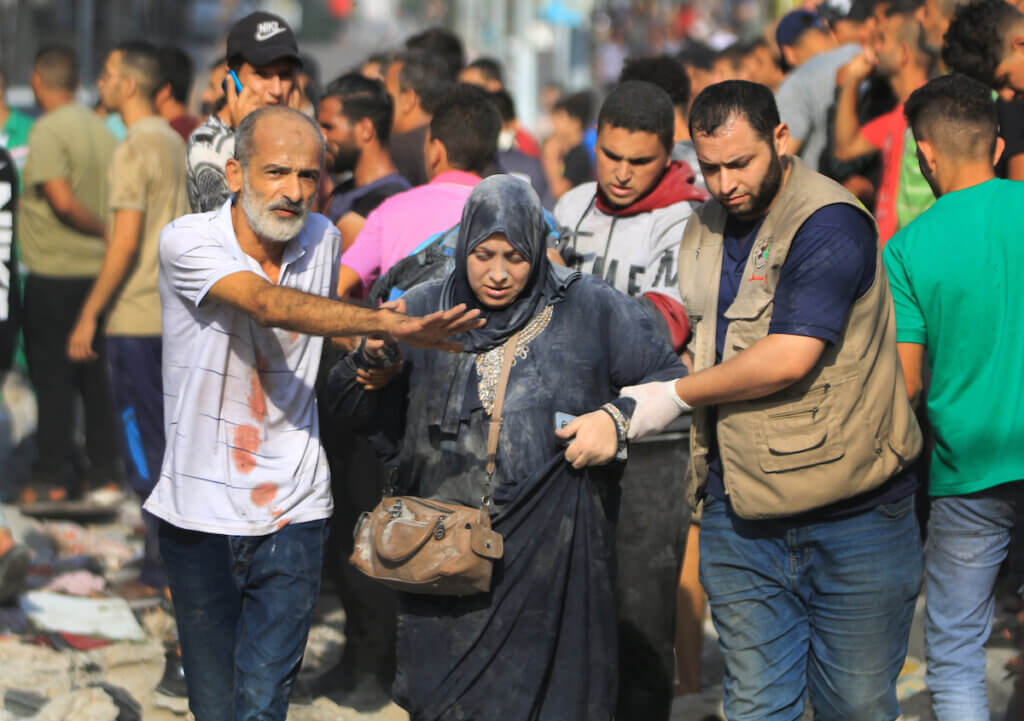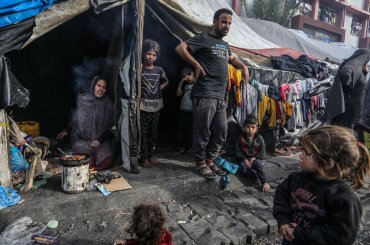Amid the ruins of Gaza, a young mother cradles her burgeoning belly and navigates through the labyrinth of desolation toward the nearest hospital. Each step she takes is a gamble against fate as the menacing roar of warplanes looms overhead. The hospital, once a humble abode of healing, now stands battered yet defiant against the reign of terror that besieges the land.
As the violence escalates during the current genocide, the essential healthcare needs of women are facing an extreme crisis. The healthcare system in the Gaza Strip, already strained by years of attacks, military blockade, and settler colonization, is only being sustained through the tireless efforts of medical staff. While this reality is being ignored in the mainstream media, the people on the ground, particularly through tweets, videos, and interviews, are sharing a grim reality that is both heart-wrenching and a call to action. Here are some of the stories of the healthcare plight faced by women, expectant mothers, and female healthcare professionals in Gaza during the ongoing 19 days of bombing.
Menstrual health crisis
A basic yet crucial aspect of women’s healthcare, menstrual hygiene management, has become a dire challenge in Gaza today. Tweets circulating across social media from women in the Gaza Strip reveal the harsh realities they grapple with due to the scarcity of sanitary products, medicines, and clean water.
“Some women in Gaza have no options but to take norethisterone tablets (to stop their monthly periods) due to a lack of sanitary pads and water for washing/ sterilization. Many menstruating women are faced with double physical pains, of sleeping on floors, the cold, and fear,” Sarah Ashour wrote on X.
Some have resorted to contraceptives to halt their menstrual cycles temporarily, a desperate measure that may have long-term health implications.
As journalist Hind AlKhoudary told me, women who are in the hospital or nearby areas are able to get the limited resources available in pharmacies nearby. However, other women in the Gaza Strip are less fortunate and are barely getting their hygienic needs met.
M.R, a 23-year-old young woman from Gaza, briefly spoke to me about the situation she and her cousins are living under–the horrifying scenes and dreadful nights of the attacks before losing her internet connection.
“My cousins and I had to start taking contraceptive pills to stop our periods from coming because it is extremely hard to get sanitary pads with all the carpet bombing happening,” M.R says. “We can’t get painkillers for cramps, and we don’t have the luxury of rest we need to soothe the pain during the ongoing aggression.”
Pregnancy and neonatal care
The rapidly increasing aggression in Gaza has led to an overwhelming number of casualties, overshadowing the crucial healthcare needs of expectant mothers and newborns. The United Nations Population Fund estimates that at least 50,000 pregnant women in Gaza are unable to access essential health services due to overwhelmed hospitals and movement restrictions.
Hundreds of mothers have lost their children, and dozens of other women have died with their kids still inside their wombs. Fetuses are being laid down in graves next to their slain mothers every day.
Amid this healthcare crisis, about 5,500 women are anticipated to give birth in the coming month, with medical facilities strained to their limits. The relentless airstrikes have forced at least twelve of nearly 30 hospitals in Gaza to shut down, leaving the remaining hospitals grappling with a flood of patients amid scarce resources. These closures exacerbate the crisis for 120 to 130 newborns who lie in electric incubators across the Gaza Strip, their lives hanging precariously in the balance due to erratic electricity and oxygen supply.
Practioner mental health
The dreadful situation in Gaza’s hospitals comes to life through the eyes of Dr. Sara Al Saqqa, a general surgeon at Al-Shifa Hospital. In a heart-wrenching video, she unveils the grim reality of medical professionals on the ground.
“There is no space, we work in the operating room while patients are packed in the recovery area waiting for a bed to stay at. There are no rooms,” she reveals with a quivering voice. She continues, “We have to prioritize between people who have a better chance of survival rather than who has it worse.” This testimony offers a glimpse of the emotional disturbance engulfing the healthcare professionals in Gaza.
The violent attacks on Gaza have imposed a grueling burden on its healthcare professionals, particularly the female doctors and nurses tirelessly working amid the chaos, who are shocked by receiving their husbands, sons, and other family members as they perform their duty. Their ordeal transcends the physical exhaustion as they navigate through a scarcity of medical supplies, continual attacks on medical facilities, and floods of casualties.
The emotional toll is immense, witnessing horrifying scenes daily. Multiple videos of female doctors and nurses breaking down amid the dreadful situation hospitals face are circulating around social media. In one video, a woman’s breakdown outside the Shuhadaa Al Aqsa hospital following an explosion reflects the grotesque reality faced by medical staff. Their unwavering commitment under such dire circumstances underscores not only their resilience but also the harrowing human cost of the ongoing aggression.
The horrors of attacks are not just physical but extend deep into the psychological realm. Women in Gaza are bearing witness to unspeakable extreme violence and loss on a daily basis, which is manifesting in severe emotional distress.
The mental health crisis is expanding precipitously amidst the rubble, yet access to proper psychological support and counseling is scarce. Each tweet narrating an episode of panic or an emotional meltdown is a stark reminder of the invisible scars etched by the aggression, scars that demand urgent attention and care in a setting where survival is the daily priority.
The healthcare crisis in Gaza is a reflection of the broader socio-political turmoil engulfing the tiny enclave. The stories from Gaza are not merely digital cries for help but are emblematic of the dire need for humanitarian intervention and the need for an immediate ceasefire. Addressing the healthcare needs of women and supporting the female medical workforce is not only a moral imperative but a crucial step towards alleviating the human cost of the ongoing oppression and occupation.



Any way you look at it, there is no justification for the inhumane treatment meted out to these poor civilians, who had nothing to do with the Hamas attack on Israel. This is sheer evil, and it is unacceptable. Biden has given the green light for what people are now calling a genocide, and every bomb that is dropped on churches, schools, mosques, UN shelters, hospitals, ambulances, and homes, wiping out entire families, has the US stamp of Approval on it.
This will be Biden’s legacy.
History will always state that the US was complicit in Israel’s violating international laws, and the slaughter of women and children. The children of Gaza will forever be traumatized, and experts have stated that the majority of children already have mental problems.
Reply to Jon s: Jon you urge Israel to stop indiscriminately killing men, women and children and I am convinced not a single rocket will reign down on Israel from Hamas. However who can speak for Lebanon and Syria. They condemn Israel’s genocidal killing of innocents.
Urge Hamas to end the war and end their people’s suffering.